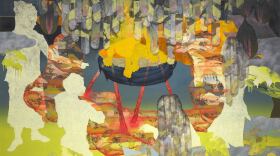Duke University has forged a relationship with South Sudan that it hopes will fill the stomach and the soul.
Many people around the world probably remember how devastating life was in parts of Ethiopia during the 1984 drought. Duke Biology Professor Mary Eubanks remembers.
“That was heart-breaking to me personally and I think at that point in time, I just made a personal commitment if I was ever able to help, I wanted to help," said Eubanks.
This is what aired on BBC News in 1984:
“In Ethiopia seven million people are threatened by starvation, thousands have already died. The famine caused by drought is the worst in living memory and now the rains have failed again.”
Eubanks soon successfully crossed two wild relatives of maize. Now, the hybrid is used in a new variety of corn that is resistant to drought, floods and insects. Today, the seeds are being grown in Africa, but not in Ethiopia, in South Sudan. Akec Khoc is the South Sudanese Ambassador to the United States.
“It is even better, it tastes better, it is much more nutritious than the food we, the maize we normally eat. And no one has ever complained," said Khoc.
Khoc visited Duke University this week for a symposium on Food Security in Africa: The Case for South Sudan. He also got the chance to visit the greenhouse, the Phytotron facility, where the corn is grown and tested. Khoc says more than 50 percent of the South Sudanese don’t have enough food to sustain themselves.
Duke Divinity School professor Ellen Davis helped get the maize seeds to Renk, South Sudan where they are being grown at the Renk Theological College.
“They don’t separate their religious life from their social life, from their material life from their economic life. All of those things are part of one package of living wisely and faithfully or not," said Davis.
“Food security is not an issue of the family, it is not an issue of community in South Sudan, it concerns all of us, it concerns humanity. So we can work together for the benefit of all. Thank you very much," said Khoc, wrapping up his presentation at the symposium.
Khoc says there is already talk of expanding the maize project to nearby communities.







